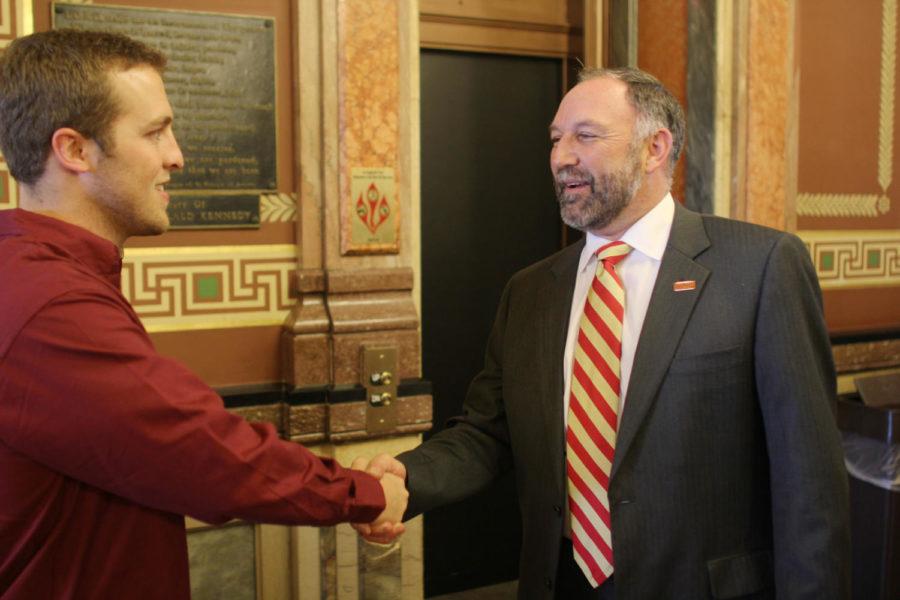Perdios: Leadership 101: Ten books for success
Photo: Kait McKinney/Iowa State
President Steven Leath talks hands with Stephen Veit, junior in political science, while at the Iowa Capitol for Regents’ Day. Leath made an appearance to represent all three presidents from Iowa’s public universities to express their pride in students who showed up.
April 9, 2012
It has come to my attention that certain members of GSB’s ISU Ambassadors have been working hard to keep tuition low for Iowa State students. They have worked behind the scenes with state legislators and officials, paving the way for more student involvement. Their efforts are evident in the front-page articles of the Daily. So I have to give credit where credit is due, especially in the wake of my scathing three-part column criticizing GSB. While the outcome of their work remains to be seen, they are displaying leadership characteristics and tactics unlike their predecessors.
So with this in mind, I offer the following ten books on leadership (and life) that have helped me when I was involved various student organizations when I was an undergraduate. These books aren’t meant just for members of GSB, anybody can find value these books. So here they are, in no particular order:
1. “Developing the Leader Within You,” by John C. Maxwell. This is the first book in Maxwell’s books on leadership and is a good place to begin. The book is fairly short, only 191 pages with large typeface, but covers the basics of leadership well. This is also the very first book on leadership I read. I still have my original copy.
2. “Beyond Talent,” by John C. Maxwell. This book comes later in Maxwell’s leadership series. There are plenty of talented people out there, but many rely on talent alone to simply drift through life. Other skills, such as leadership, coachability and the diligence to prepare, need to be cultivated in order to be truly successful. I was thinking of this book when I wrote the column on what Iowa State’s new slogan should be: Victoria Amat Preparatio—Victory Loves Preparation.
3. “How to Win Friends and Influence People,” by Dale Carnegie. This book is a classic. Some of the examples might be outdated since it was written in the 1930s. This is the granddaddy of all motivational reading, and its lessons are still applicable after all these years. It’s still a best-seller. The runner up to this classic is…
4. “How to Stop Worrying and Start Living,” by Dale Carnegie. Five years ago, this book helped me get out of the nervous wreck I was in when I was a college dropout with little or no prospects for the future. Worry ages people. Worry paralyzes people into inaction or what’s been called “paralysis by analysis.”
5. “The Hero With a Thousand Faces,” by Joseph Campbell. I think one of the problems with America’s culture is it lacks a mythology to properly guide it. Being a leader often means being heroic, going off the beaten path and thinking unconventionally. The heroes of myth do the same. And both encounter similar obstacles and trials, especially that first step to cross the threshold into the unknown.
6. “Getting Everything You Can Out of All You’ve Got,” by Jay Abraham. The real gem in this book is the questionnaire on pages 50 to 55. While the questionnaire is meant for developing a business plan or to improve on an existing one, it can be applied to almost any organization. I’ve used this questionnaire successfully in the student clubs I was in when I was an undergraduate. In one case, a club’s membership tripled in part because of the ideas found within this book.
7. “The Monk and the Riddle,” by Randy Komisar. While this book mostly applies to entrepreneurship, it addresses nearly everybody’s desire to find his or her calling in life. A leader invests his or herself fully into a given project or process, instead of just padding their resume or making a quick buck and then leaving.
8. “Wild Mind: Living the Writer’s Life,” by Natalie Goldberg. Goldberg says the rules for writing practice also apply to having sex. I say the same rules also apply to leadership. Want to know the rules? Read the book.
5. “Rich Dad, Poor Dad,” by Robert T. Kiyosaki. This book is more about opening one’s mind to different possibilities rather than getting rich. The other books in his series often repeat the same message found in this book. Indeed, being a leader really is about keeping an open mind and envisioning different possibilities.
10. “Critical Path,” by R. Buckminster Fuller. This is Fuller’s magnum opus, published about two years before he died in 1983. This weighty tome should not be read lightly. It contains some pretty dense language. He invented such terms like “spaceship earth,” “ephemeralization” and the buzzword now used by many companies “synergy.” I’m not going to tell you what it is about. You need to read it for yourself.
Enjoy!










